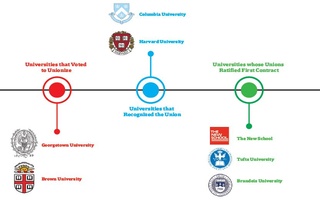{shortcode-19598504d233ac79267bf3c10ddd9c671e76010c}
The Harvard Graduate Students Union-United Automobile Workers bargaining committee went to their first-ever bargaining session with the University in October bearing an 80-count wish list and cheering optimistic chants. Just a month later, they say those goals will likely be hard-won.
The committee wrote in an email to union members on Nov. 6 that their first two bargaining sessions — one in October and one in November — were marked by forceful pushback from Harvard administrators. In particular, the committee wrote the union took issue with University counter-proposals seeking to maintain existing procedures surrounding sexual harassment allegations and to exclude hourly workers from the bargaining unit.
Efforts to change Harvard’s grievance procedures surrounding sexual misconduct allegations have been a central pillar of HGSU-UAW’s contract goals. Before negotiations began, union members said bargaining for these changes would be among their first asks of Harvard — a strategy they have pursued.
The committee wrote in the email that “the administration dismissed our non-discrimination and harassment proposal” and responded by “offering just the current policies.”
“Our members have been loud and clear that the current system is broken, but the administration has so far refused to make any substantive changes to their policies,” the email reads. “Under their proposal, discrimination and harassment would not be subject to the grievance procedure.”
University spokesperson Melodie L. Jackson wrote in an email that Harvard “is committed to the safety and well-being of all members of our community, which is which is why we have invested significant resources in recent years to strengthen our policies, grievance procedures, training and support.”
“Harvard's nondiscrimination and harassment policies are strong and clear and have been strengthened in recent years with vast community input,” she wrote. “Let there be no mistake that the University is actively engaged in negotiating this proposed article and more than 30 others that are currently on the table.”
HGSU-UAW is not alone among graduate unions in pushing for contract provisions related to sexual misconduct. Graduate unions at the University of Connecticut and New York University — both of which HGSU-UAW has cited in the run-up to negotiations — have successfully bargained for reforms in this area. The UConn contract allows union officials to advocate for members who have filed allegations of harassment with the university, and the NYU contract specifies that violations of its nondiscrimination agreement constitute grounds for a formal union grievance.
Administrators also disputed HGSU-UAW’s characterization of members’ workloads over the course of negotiations, according to the email from union organizers. To support their proposals, bargaining committee members recounted personal experiences they had asked union members to share with them.
Per the email, administrators allegedly called the testimony “a good story, if true.”
Despite their description of the University’s pushback, the bargaining committee will continue to marshal members’ stories, the committee wrote. The email ends with a call for additional accounts of “discrimination, harassment, unsafe working conditions, or unfair workloads.”
In response to the first two sessions, the bargaining committee also wrote it plans to ask Harvard to schedule longer and more frequent negotiations. Earlier this semester, HGSU-UAW members said they hoped to meet administrators five or six times before winter break.
“To reach an agreement in any reasonable time, Harvard needs to demonstrate that it is committed to addressing students’ demands and meet on a more frequent basis,” the email reads.
Bargaining committee member Madeleine F. Jennewein wrote in an emailed statement that, after receiving a “thoughtful proposal” from HGSU-UAW, the University proposed an “unacceptable” response.
“The administration has so far denied our proposal and instead proposed maintaining the status quo, which leaves survivors in the hands of a system that most student workers believe is ill-equipped to deliver a fair investigation and recourse,” Jennewein wrote. “We will continue to call on the administration inside and outside of the negotiation room to reach a fair agreement.”
Jennewein wrote it is “no secret” that some students feel “widespread dissatisfaction” with University procedures for responding to sexual misconduct allegations.
In her statement, Jackson wrote that while the University has “no desire to prolong this process unnecessarily,” it is “important to remember we are starting from scratch and care must be taken in drafting contractual language.”
“Our priority is to create an agreement that is fair for the university, the members of this union, and all the students we serve,” she wrote. “Let there be no mistake that the University is actively engaged in negotiating [articles surrounding grievance procedures] and more than 30 others that are currently on the table.”
The union and University have not announced the date of a third bargaining session.
—Staff writer Shera S. Avi-Yonah can be reached at shera.avi-yonah@thecrimson.com. Follow her on Twitter at @saviyonah.
—Staff writer Molly C. McCafferty can be reached at molly.mccafferty@thecrimson.com. Follow her on Twitter at @mollmccaff.
Read more in University News
Former Treasury Secretary Lew Talks Faith and Politics at Harvard LawRecommended Articles
-
 Union Bargaining Committee Election Sees Low Turnout
Union Bargaining Committee Election Sees Low Turnout -
 We’re Ready to Bargain for A Better Harvard
We’re Ready to Bargain for A Better Harvard -
 Grad Unionization Movement Sees Successes Nationwide As Harvard Begins Bargaining
Grad Unionization Movement Sees Successes Nationwide As Harvard Begins Bargaining -
 Clerical Union Votes to Ratify Contract With Harvard, Ushering In Raises, Protections for Temps
Clerical Union Votes to Ratify Contract With Harvard, Ushering In Raises, Protections for Temps -
 Graduate Student Union Organizers-Turned-Negotiators Learn to Bargain
Graduate Student Union Organizers-Turned-Negotiators Learn to Bargain













